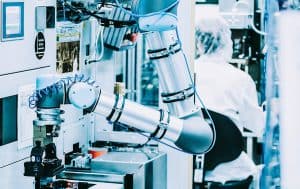
Continental
Advanced manufacturing for value creation
An interview with Dr. Róbert Keszte, Managing Director, Continental Automotive Hungary GmbH, Budapest

Continental is a pioneering market player in the field of technology andinnovations in automotive industry in Hungary. How do you see the market trends and the manufacturing challenges nowadays in this sector?

The name of the game in the manufacturing industry has remained the same: cost competitiveness. In the past, we implemented various strategies, technologies and methods to help us continuously increase our efficiency. In the last decade, high-speed and low-cost connectivity became the mainstream of market trends. However, we need to use connected systems smartly to collect and analyze data, recognize patterns, generate predictions, and feed it back to process improvement. Now the challenge is to move from theory towards real application.
To be more specific, let us follow the value chain: we always need to start at the product, which has to be robust and designed for manufacturing. We appreciate if the product has advanced built in functions, which support the manufacturing and testing process. Then we need to use proven lean principles for industrialization, to create a stable, sustainable, and innovative production line that supports flexibility and quick reaction to market changes. We need to merge lean line design with the latest technologies in automation and robotization. Seeing the favorable trend of light-weight robots and other similar automation solutions, I am optimistic, that most new investments will have the capability to be supervised and improved by artificial intelligence agents.
The greatest challenge is that we have to operate legacy assets together with the most modern equipment, all with the same production staff. This requires high discipline and diverse skills. The upskilling of manufacturing personnel is an essential part of our success.
Which role do digitization and industry 4.0 play in future manufacturing? What is the strategy in this regard at Continental Automotive in Hungary?
Digitalization already plays an increasingly essential role in manufacturing. All mass-production equipment has a digital control unit, which collects data and sends it to our database. Today we mainly collect data and evaluate it off-line. To gain more competitive benefits from digital technologies we need to move rapidly towards real-time data processing – not only on the shop floor but also in all supporting areas.
Therefore, after prioritizing digital technologies, we will integrate fast payback solutions like cobots and AGVs in the production, mobile and wearable devices in the warehousing, Robotic Process Automation and Business Intelligence reports in the supporting processes. Other activities such as using artificial intelligence for decision making processes is planned for the upcoming years.

What changes do you expect on the talent demand and the workforce transformation by implementing digital manufacturing solutions?
The entire industry is facing the challenge of making manufacturing jobs appealing. At Continental we are working on creating an inspiring digital working environment with maximum flexibility at work. We train, coach and mentor our employees in order to prepare them for the future competencies. We need to extend and transform our engineering knowledge from hardware to software development due to the rapidly increasing digitization of products, manufacturing, and services.
We must understand the business opportunities of advanced technologies and define proper actions to boost efficiency.
